20. July 2018 - 10:26
Saint Kyriake was the only child of Dorotheus and Eusebia. Since she was born on a Sunday (Kyriake, in Greek), she was named Kyriake.
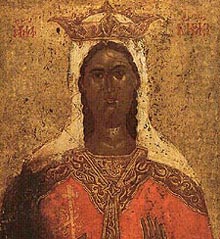 One day a wealthy magistrate wished to betroth Kyriake to his son. Not only was she young and beautiful, but her parents were wealthy, and the magistrate wished to control that wealth. The magistrate went to her parents to request her hand, but Saint Kyriake told him that she wished to remain a virgin, for she had dedicated herself to Christ.
One day a wealthy magistrate wished to betroth Kyriake to his son. Not only was she young and beautiful, but her parents were wealthy, and the magistrate wished to control that wealth. The magistrate went to her parents to request her hand, but Saint Kyriake told him that she wished to remain a virgin, for she had dedicated herself to Christ.
The magistrate was angered by her words, so he went to the emperor Diocletian to denounce the saint and her parents as Christians who mocked the idols, and refused to offer sacrifice to them.
Diocletian sent soldiers to arrest the family and have them brought before him. He asked them why they would not honor the gods which he himself honored. They told him that these were false gods, and that Christ was the one true God.
17. July 2018 - 10:32
Today the Tsar is with Sts. Boris and Gleb, with St. Sergius, with Blessed Ksenia, with St. Seraphim. There is neither treason nor flattery around him. He has much more power and strength.
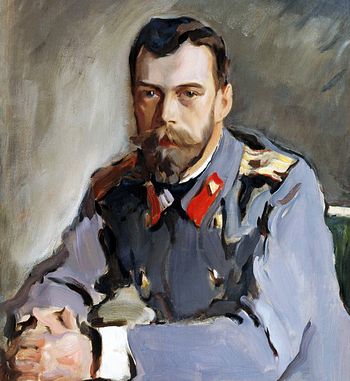 The sovereign emperor has more power today than one hundred years ago. A hundred years ago, propaganda efforts turned him into a monster, personifying the state system, earmarked for ruthless annihilation. Cruelty, indifference, luxury, and debauchery were attributed to the regime. All of this was automatically transferred to the image of the reigning house, and so successfully that yesterday’s “loyalists” silently partook of the murder of the head of state and the whole household.
The sovereign emperor has more power today than one hundred years ago. A hundred years ago, propaganda efforts turned him into a monster, personifying the state system, earmarked for ruthless annihilation. Cruelty, indifference, luxury, and debauchery were attributed to the regime. All of this was automatically transferred to the image of the reigning house, and so successfully that yesterday’s “loyalists” silently partook of the murder of the head of state and the whole household.
And today? Today we have been sobered by the events of the previous century. After all, we know that the luxury of the oligarchs exceeds that of the tsars at times, although wholly devoid of any moral justification. The debauchery of today’s global Sodom makes us look at many sinners of former times as at kindergarten students. And the indifference of people to one another in a world where money is the main value is unmatched. As for cruelty, the twentieth century surpassed all. The tongue goes numb here and fingers refuse to type.
17. July 2018 - 10:30
At one time, even fairly recently, the date July 17 in the so-called “new style,” was marked as a day of sorrow, because on this day the Russian people and the Russian diaspora remembered the great evil act when the Royal Family was brutally killed in the basement of Ipatiev House.
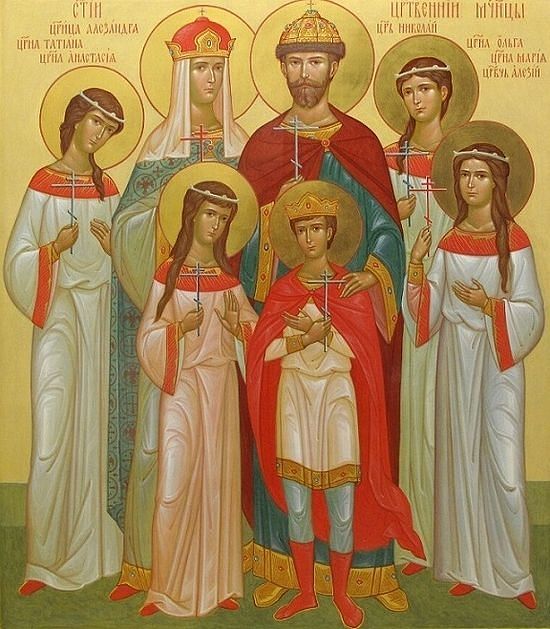 This was a day of mourning, but no longer! Now the Royal Family has been glorified as a family of holy martyrs. Never forget that when the Church glorifies a saint, the act itself does not create the saint, it only declares to the people that this person or this group of people have been glorified in God.
This was a day of mourning, but no longer! Now the Royal Family has been glorified as a family of holy martyrs. Never forget that when the Church glorifies a saint, the act itself does not create the saint, it only declares to the people that this person or this group of people have been glorified in God.
In the collection of the Lives of Saints we see a wonderful example. Once there was a man who occupied a very lofty position, he was renowned and wealthy, but he left to join a monastery, to become a monk, and took up the life of the ascetics, in fasting, prayer and deprivation. Others lived nearby who shared his way of life, many of them were more severely ascetic than he. Yet the faithful began to flock to him, benefiting from his inspired spiritual discussions and guidance, and the Lord glorified him with the gift of sagacity and miracles. One of the monks asked his elder: why is this so? “This man is an ascetic, of course, but he is no better than the others, in fact, there are others who lead stricter ascetic lives, but are not granted the gifts of discernment or miraculous works, with such spiritual talents. Why did the Lord bestow these upon him, then?”
17. July 2018 - 10:29
Sermon read by Archbishop Mark of Berlin on the feast day of the Holy New Martyrs and Confessors of Russia in 2001
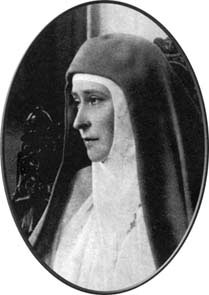 The Divine meaning of suffering can be understood only through the help of grace. For this, the Lord consoles His sorrowful disciples and all of us, sending us “the Comforter… even the Spirit of truth” Who “will guide you into all truth” (John 15:26, 16:13).
The Divine meaning of suffering can be understood only through the help of grace. For this, the Lord consoles His sorrowful disciples and all of us, sending us “the Comforter… even the Spirit of truth” Who “will guide you into all truth” (John 15:26, 16:13).
The Holy New Martyrs of Russian are close to us in time and in spirit, the spirit in which we were raised, which we have assimilated to the best of our abilities. Today, the iconostasis of our church contains relics of the Holy Martyrs Elizabeth and Barbara, who are particularly close to us. Holy Grand Duchess Elizabeth was a princess of Darmstadt, who left her homeland and found a new one, both spiritual and physical. In the terrible years of persecution, her cell-attendant, the Russian novice Barbara, joined her, and they proceeded towards martyrdom together.
14. July 2018 - 23:08
The Placing of the Venerable Robe of the Most Holy Theotokos at Blachernae: During the reign of the Byzantine Emperor Leo the Great (457-474), the brothers Galbius and Candidus, associates of the emperor, set out from Constantinople to Palestine to venerate the holy places.
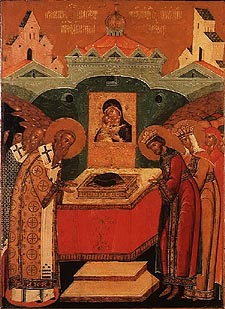 In a small settlement near Nazareth they stayed in the home of a certain old Jewish woman. In her house they noticed a room where many lamps were lit, incense burned, and sick people were gathered. When they asked her what the room contained, the pious woman did not want to give an answer for a long time. After persistent requests, she said that she had a very precious sacred item: the Robe of the Mother of God, which performed many miracles and healings. Before Her Dormition the Most Holy Virgin bequeathed one of her garments to a pious Jewish maiden, an ancestor of the old woman, instructing her to leave it to another virgin after her death. Thus, the Robe of the Mother of God was preserved in this family from generation to generation.
In a small settlement near Nazareth they stayed in the home of a certain old Jewish woman. In her house they noticed a room where many lamps were lit, incense burned, and sick people were gathered. When they asked her what the room contained, the pious woman did not want to give an answer for a long time. After persistent requests, she said that she had a very precious sacred item: the Robe of the Mother of God, which performed many miracles and healings. Before Her Dormition the Most Holy Virgin bequeathed one of her garments to a pious Jewish maiden, an ancestor of the old woman, instructing her to leave it to another virgin after her death. Thus, the Robe of the Mother of God was preserved in this family from generation to generation.
8. July 2018 - 14:02
Febronia was the daughter of Prosphorus, a senator from Rome. In order to avoid marriage with a mortal man, Febronia betrothed herself to Christ and was tonsured a nun in the east, in the country of Assyria, in a convent where her aunt Bryaena was abbess. Lysimachus, the son of a nobleman, desired to wed Febronia but since Emperor Diocletian suspected him to be a secret Christian, he sent Lysimachus to the east  with his uncle Silenus to apprehend and kill Christians. Silenus was as cruel as a beast and exterminated Christians everywhere without mercy. Lysimachus, on the contrary, spared the Christians wherever he could and hid them from his beast-like uncle. Making Palmyra a wasteland of Christians, Silenus came to the town of Nisibis close to which was a convent with fifty ascetics among whom was Febronia.
with his uncle Silenus to apprehend and kill Christians. Silenus was as cruel as a beast and exterminated Christians everywhere without mercy. Lysimachus, on the contrary, spared the Christians wherever he could and hid them from his beast-like uncle. Making Palmyra a wasteland of Christians, Silenus came to the town of Nisibis close to which was a convent with fifty ascetics among whom was Febronia.
 The sovereign emperor has more power today than one hundred years ago. A hundred years ago, propaganda efforts turned him into a monster, personifying the state system, earmarked for ruthless annihilation. Cruelty, indifference, luxury, and debauchery were attributed to the regime. All of this was automatically transferred to the image of the reigning house, and so successfully that yesterday’s “loyalists” silently partook of the murder of the head of state and the whole household.
The sovereign emperor has more power today than one hundred years ago. A hundred years ago, propaganda efforts turned him into a monster, personifying the state system, earmarked for ruthless annihilation. Cruelty, indifference, luxury, and debauchery were attributed to the regime. All of this was automatically transferred to the image of the reigning house, and so successfully that yesterday’s “loyalists” silently partook of the murder of the head of state and the whole household.
 One day a wealthy magistrate wished to betroth Kyriake to his son. Not only was she young and beautiful, but her parents were wealthy, and the magistrate wished to control that wealth. The magistrate went to her parents to request her hand, but Saint Kyriake told him that she wished to remain a virgin, for she had dedicated herself to Christ.
One day a wealthy magistrate wished to betroth Kyriake to his son. Not only was she young and beautiful, but her parents were wealthy, and the magistrate wished to control that wealth. The magistrate went to her parents to request her hand, but Saint Kyriake told him that she wished to remain a virgin, for she had dedicated herself to Christ. This was a day of mourning, but no longer! Now the Royal Family has been glorified as a family of holy martyrs. Never forget that when the Church glorifies a saint, the act itself does not create the saint, it only declares to the people that this person or this group of people have been glorified in God.
This was a day of mourning, but no longer! Now the Royal Family has been glorified as a family of holy martyrs. Never forget that when the Church glorifies a saint, the act itself does not create the saint, it only declares to the people that this person or this group of people have been glorified in God. The Divine meaning of suffering can be understood only through the help of grace. For this, the Lord consoles His sorrowful disciples and all of us, sending us “the Comforter… even the Spirit of truth” Who “will guide you into all truth” (John 15:26, 16:13).
The Divine meaning of suffering can be understood only through the help of grace. For this, the Lord consoles His sorrowful disciples and all of us, sending us “the Comforter… even the Spirit of truth” Who “will guide you into all truth” (John 15:26, 16:13). In a small settlement near Nazareth they stayed in the home of a certain old Jewish woman. In her house they noticed a room where many lamps were lit, incense burned, and sick people were gathered. When they asked her what the room contained, the pious woman did not want to give an answer for a long time. After persistent requests, she said that she had a very precious sacred item: the Robe of the Mother of God, which performed many miracles and healings. Before Her Dormition the Most Holy Virgin bequeathed one of her garments to a pious Jewish maiden, an ancestor of the old woman, instructing her to leave it to another virgin after her death. Thus, the Robe of the Mother of God was preserved in this family from generation to generation.
In a small settlement near Nazareth they stayed in the home of a certain old Jewish woman. In her house they noticed a room where many lamps were lit, incense burned, and sick people were gathered. When they asked her what the room contained, the pious woman did not want to give an answer for a long time. After persistent requests, she said that she had a very precious sacred item: the Robe of the Mother of God, which performed many miracles and healings. Before Her Dormition the Most Holy Virgin bequeathed one of her garments to a pious Jewish maiden, an ancestor of the old woman, instructing her to leave it to another virgin after her death. Thus, the Robe of the Mother of God was preserved in this family from generation to generation.
